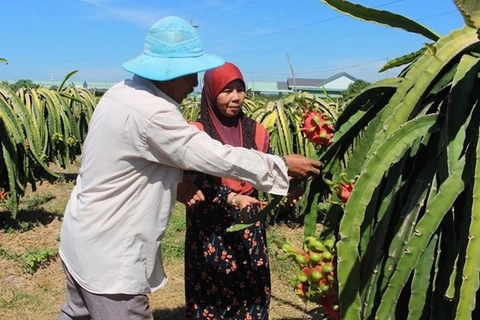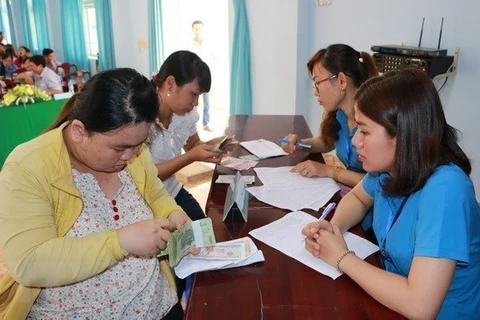 Many families escape poverty thanks to preferential loans for developing traditional crafts. (Photo: VNA)
Many families escape poverty thanks to preferential loans for developing traditional crafts. (Photo: VNA) Hanoi (VNA) - NA deputies have emphasised the need to provide vocational training for people, especially those in ethnic minority areas, and have specific policies for households that have just escaped poverty in order to avoid falling back into the situation.
They discussed this content during their sitting for the 15th National Assembly’s ongoing first session on July 27, which mulled over investment policies in the National Target Programme on Sustainable Poverty Reduction and the National Target Programme on New-Style Rural Development for the 2021-2025 period.
The National Target Programme on Sustainable Poverty Reduction for the 2021-2025 period comprises six projects and 11 sub-projects, benefiting poor, near-poor households and families recently escaping poverty across the country, disadvantaged workers, residents living in poor districts and communes in coastal and island areas, vocational training establishments and job service centres in disadvantaged areas, relevant organisations and individuals.
Meanwhile, the National Target Programme on New-Style Rural Development for the 2021-2025 period will benefit residents, residential communities, cooperatives, businesses and socio-economic organisations in rural areas.
More resources for the poor
According to Nguyen Thi Mai Hoa, a deputy from the southern province of Dong Thap, the Government needs to change its approach by focusing on promoting economic development within groups of households, consider this a lever for poverty reduction.
The deputy suggested the Government reduce donations and increase concessional loans to the poor.
“We should only provide resources and encourage the poor to rise up on their own”, she said.
Hoa pointed out impacts of the COVID-19 pandemic for the poor, while proposing separating the group of social policy beneficiaries from this programme.
Specific policies should be developed for this group because they are unable to escape poverty, she said.
Hoa also underlined the importance of investing in humans, noting that it is necessary to place people at the centre.
Attention should be paid to life, health, education, vocational training, creating livelihoods and transferring scientific advances to the people, she said.
The deputy said it is possible to provide more capital for women to develop traditional occupations and local products with potential for development.
However, she also mentioned the risk of overlaps in the capital allocation of the two national target programmes.
Vocational training to help people get out of poverty
Sharing Hoa’s view, Nguyen Thi Thu Dung, a deputy from the northern province of Thai Binh, emphasised that vocational training will help the poor have labour skills and create their own livelihoods, so that they can rise out of poverty in a sustainable manner.
She cited data, saying that up to 90 percent of people have jobs and better incomes after receiving vocational training.
“We need to pay attention to long-term formal training”, Dung said.
She suggested the Government review and allocate investment capital for high-quality vocational schools, and create favourable conditions for non-public vocational schools.
Meanwhile, deputy Trieu Thi Huyen from the northern mountainous province of Yen Bai said the programme is a humane policy, showing the attention of the Government and State to difficult areas and disadvantaged people, thus ensuring social equality and maintaining economic development.
Huyen also informed participants of poverty reduction situation in Yen Bai, noting that the locality has made efforts to realise relevant targets but the poverty rate still remains high.
It is necessary to expand vocational training programmes for the people, especially ethnic minorities, and have specific policies for households that have just escaped poverty./.



























